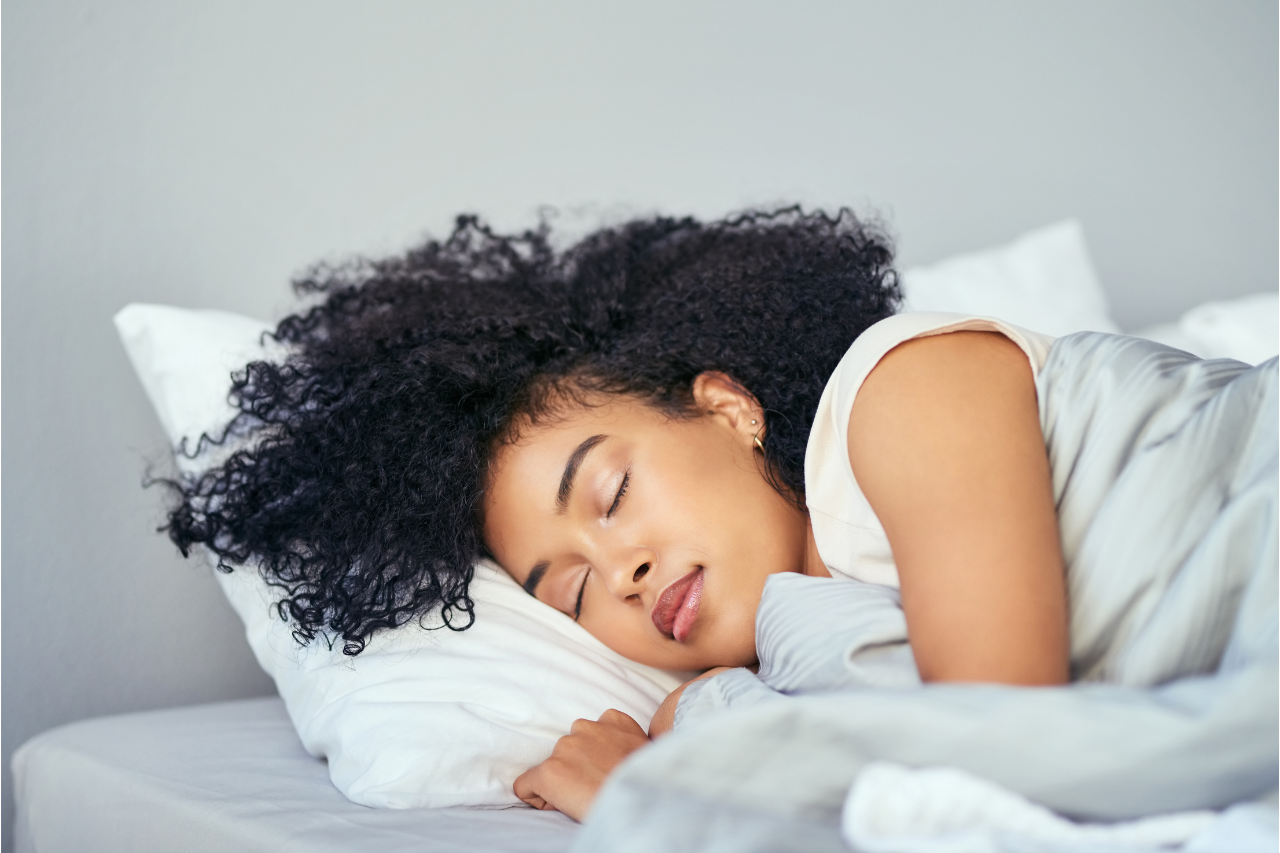
Myths vs. Facts: Sleep Deprivation Revealed

Share:
Sleep is essential for a healthy lifestyle, and it can have a major impact on your physical and mental well-being. While sleep needs vary from person to person, most adults need between 7-9 hours of sleep each night. Unfortunately, many people still believe in sleep myths that can prevent them from getting the rest they need. In this article, we’ll take a closer look at sleep myths and facts, discuss whether five hours of sleep is enough for adults, and explore what time you should sleep to help you lose weight.
Let’s get started!
Is Sleep Debt a Myth?
Sleep deprivation is a serious problem and sleep debt can accumulate over time. Unfortunately, many people are sleep deprived without realizing it and not getting the recommended seven to eight hours of sleep per night can have far-reaching consequences for health and wellbeing.
One common sleep myth is that five hours of sleep is enough or that sacrificing sleep can help you lose weight. Unfortunately, this is not true. Getting five hours of sleep or less can lead to short and long-term health consequences, including obesity. Not getting enough sleep also interrupts your body’s ability to regulate hormones related to hunger and fullness which can further contribute to weight gain.
Another sleep myth is that you can “catch up” sleep on the weekends. While it is true that you can sleep more than usual and make up for some sleep debt, this practice is not recommended as a long-term solution. It is much better to maintain consistent sleep patterns in order to get the quality and quantity of sleep required for optimum health.
Finally, another sleep myth is that sleep is a waste of time. On the contrary, sleep is essential for physical and mental restoration, cognitive processes such as learning and memory consolidation, and emotional regulation. By prioritizing sleep you can be more productive throughout the day and improve your overall health and well-being.
Key Takeaways
To recap, sleep is essential for physical and mental health and getting the recommended 7-8 hours of sleep per night is important for maintaining a healthy lifestyle. Five hours of sleep is not enough to ensure good health or help you lose weight, sleep debt accumulates over time, and sleep cannot be “caught up” on the weekends. Finally, sleep is not a waste of time as it can help you stay productive throughout the day and improve your overall health and well-being.
How can I sleep longer than 5 hours?
The key to getting a good night’s sleep is establishing consistent sleep patterns. This means going to sleep and waking up at the same time each day, even on weekends and holidays. You should also make sure that your sleep environment is comfortable and free of distractions such as loud noises or bright lights. Additionally, try to avoid looking at screens such as phones or computers for at least an hour before bed.
In addition to establishing sleep habits, you should also practice good sleep hygiene by avoiding caffeine and alcohol late in the day, exercising regularly, and managing stress effectively. This will help you sleep more soundly throughout the night and get more than five hours of sleep every day.
Finally, if you find that you are still not getting enough sleep despite your best efforts, it is important to speak to a healthcare professional. They can help identify any underlying medical conditions that may be interfering with sleep and provide treatment options.

Does everyone have sleepless nights?
Although everyone experiences sleepless nights from time to time due to stress, sleep deprivation is not normal. If you find that you are consistently having difficulty sleeping or waking up feeling tired and unrested, it is important to take steps to improve your sleep habits and sleep environment. Additionally, speak with a healthcare professional if the problem persists in order to identify any underlying sleep disorders or medical conditions that may be interfering with sleep.
By understanding sleep myths and facts, making sleep a priority, and getting help if needed, you can ensure that you get the quality sleep your body needs to stay healthy and energized.
How can I measure how much sleep I get?
There are many sleep-tracking devices available on the market that can help you measure sleep quality and quantity. These devices track sleep patterns throughout the night and provide useful data such as sleep duration, sleep efficiency, and sleep stages. Some of these devices also have additional features such as sleep cycle alarms which can help you wake up at the optimal time for maximum alertness. Additionally, sleep tracking apps can be used as an alternative to sleep trackers.
By using sleep tracking devices or apps, you can get a better understanding of your sleep patterns and make changes to improve sleep quality if needed. This is invaluable information for anyone looking to maximize their sleep health and wellbeing.
What time should I sleep to lose weight?
Sleeping too little or too much can lead to unwanted weight gain, as sleep deprivation increases hunger hormones and decreases metabolism. Therefore, it is important to strive for a consistent sleep schedule that allows for seven to nine hours of sleep each night. This will help regulate bodily processes such as metabolism and hormone levels, allowing you to reach your weight loss goals. Additionally, sleep is important for controlling stress levels which can otherwise lead to overeating and weight gain.
Do sleep Myths and Facts still Apply?
Absolutely! Sleep myths and facts are as relevant today as they were when they were first discovered. Many sleep studies conducted over the years have confirmed that sleep is essential for overall health and wellbeing, which is why it’s so important to understand sleep myths and facts.
Additionally, sleep is an ever-changing field of research and there are always new findings that can help to improve sleep quality and duration. Therefore, it’s important to stay up-to-date with sleep information in order to ensure the best sleep possible.
Understanding sleep myths and facts can help you make informed decisions about sleep habits and sleep environment, ultimately leading to improved sleep quality and a healthier lifestyle.
Is Five Hours of Sleep enough?
No, five hours is not enough sleep for adults. Research has shown that adults need at least seven to nine hours of sleep each night in order to maintain good health and wellbeing. Getting less than this amount can lead to sleep deprivation, which can have serious consequences such as an increased risk of accidents, impaired cognitive and physical performance, weight gain, poor immune system function, and even heart disease.
Therefore, it is important to make sleep a priority in order to ensure that you are getting the quality sleep your body needs. If sleep deprivation becomes an issue, it is important to talk to a doctor about sleep disorders or medical conditions that may be interfering with sleep.
By understanding sleep myths and facts, making sleep a priority, and getting help if needed, you can ensure that you get the quality sleep your body needs to stay healthy and energized.

Will your Body Eventually force you to Sleep?
Yes, sleep deprivation eventually leads to what is called sleep debt. This is when your body forces you to sleep in order to make up for a sleep deficit. Your body will try to force you to sleep by making you feel tired and fatigued throughout the day, even if you have had enough sleep the night before.
The sleep debt can only be paid off by getting enough sleep at night over a period of time. Therefore, it is important to understand sleep myths and facts in order to ensure that you are getting the best sleep possible and avoiding sleep deprivation.
Do short Sleepers Live Longer?
While sleep is vital for overall health and wellbeing, there is no scientific evidence that suggests that short sleepers live longer than those who sleep for seven to nine hours each night. In fact, research has shown that too little sleep can lead to an increased risk of certain illnesses such as heart disease and stroke. Therefore, it is important to get enough sleep in order to maintain good health and wellbeing.
Does Sleeping early help you Lose Weight?
Yes, sleeping early can help you lose weight. sleep plays an important role in metabolism and hormone levels, allowing your body to reach its weight loss goals. Additionally, sleep is important for controlling stress which can otherwise lead to overeating and weight gain. Therefore, getting the right amount of sleep at the right time can be beneficial for those looking to lose weight.
What Time Should I sleep to Lose Weight?
The best time to sleep in order to lose weight is between 7-9 hours before your normal wake up time. This allows your body enough time to complete the sleep cycle and produce the hormones that help with metabolism and stress management, which are essential for long term weight maintenance. Additionally, sleep helps to reduce cravings and hunger hormones, making it easier to make healthy food choices during the day.
How much sleep do I need to lose belly fat?
In order to lose belly fat, it is important to get enough sleep each night. Research has shown that adults should aim for 7-9 hours of sleep per night in order to maintain a healthy weight and reduce the risk of obesity. Additionally, sleep can help regulate hormones that are related to hunger and cravings, making it easier to make healthy food choices and maintain a healthy weight.
4 in 10 Americans have 2 or more Chronic Diseases.
This statistic is unfortunately true, as the CDC reports that over 4 in 10 Americans have two or more chronic diseases. This includes conditions such as diabetes, heart disease, and stroke. Additionally, sleep deprivation can worsen existing chronic health conditions and increase the risk of developing new ones. Therefore, it is important to get sufficient sleep each night in order to maintain your health and reduce the risk of chronic diseases.
Sleep can also help improve overall wellbeing and productivity, which is important for maintaining healthy habits. By understanding sleep myths and facts, making sleep a priority, and receiving help if needed, you can ensure that you are getting the sleep your body needs in order to stay healthy and energized.
Less Sleep is Associated with a higher likelihood of having multiple Chronic Diseases
Therefore, it is essential to get enough sleep in order to maintain good health and avoid sleep deprivation. By understanding sleep myths and facts, you can make sure that you are getting the sleep your body needs, allowing you to lead a healthier lifestyle.
It is also important to remember that sleep quality matters just as much as sleep duration. Aim to sleep in a dark, quiet, and comfortable environment in order to ensure that you are getting the best sleep possible. Additionally, make sure to avoid alcohol and caffeine close to bedtime as these can interfere with sleep quality.
Finally, if you are having trouble sleeping for an extended period of time, consider speaking with your doctor or sleep specialist to get the help you need. With good sleep habits and a healthy sleep schedule, you can ensure that you are getting the sleep your body needs to maintain good health.
Tips to Improve your Sleep Quality:
- Establish a sleep routine: It is important to go to sleep and wake up at the same time each day in order to promote good sleep hygiene.
- Avoid screens before bed: The blue light from screens can impair sleep, so try to limit your screen time before bed.
- Exercise regularly: Regular physical activity can help improve sleep quality and sleep duration.
- Sleep in a dark, quiet, and comfortable environment: Make sure your sleep environment is conducive to good sleep.
- Avoid alcohol and caffeine close to bedtime: These can interfere with sleep quality, so it is best to avoid them before sleep.
In Summary,
Sleep is an essential component of health and wellbeing. Understanding sleep myths and facts can help you make informed decisions about sleep habits in order to ensure the best sleep possible. While there is no scientific evidence that suggests that short sleepers live longer, sleep is still important for weight loss, metabolism and hormone levels. Therefore, it is important to get the recommended seven to nine hours of sleep each night for optimal health and wellbeing. Additionally, if sleep deprivation becomes an issue, it is important to talk to a doctor about sleep disorders or medical conditions that may be interfering with sleep. With the right sleep habits, you can make sure to get the best sleep possible.
Most Popular


What is Coffee Bloom and why does it happen?

20 Best Books Made Into Movies And TV Shows

Money Matters: 19 Best Personal Finance Books
Subscribe To Our Weekly Newsletter
Categories
Related Posts

Cute Girly College Ruled Composition Notebooks
Share: In a world dominated by digital tools and apps, the humble college-ruled composition notebook remains a steadfast ally in the quest for productivity. This timeless tool offers unparalleled benefits,

What is Coffee Bloom and why does it happen?
Share: When coffee is ground, the natural oils and aromatics are released. When these coffee grounds are combined with hot water, they create a “bloom” or foamy layer on top

20 Best Books Made Into Movies And TV Shows
Share: Nothing beats a great book-to-movie adaptation. Whether you’re a bookworm who loves to see their favorites brought to life on the silver screen, or a film buff looking for

Money Matters: 19 Best Personal Finance Books
Share: Financial planning is a key element of financial success. It can help you secure your financial future and meet any financial goals you may have. Whether you’re looking to

15 Of The Best Books that are Movies
Share: Do you ever find yourself drawn to Teen Books Made into Movies? Whether it’s the adventure of a classic novel or the modern-day drama of a contemporary story, movies

Women’s Guide to Growth: Best 11 Books
Share: Self-help books have become increasingly popular over the years, with more and more people looking for ways to improve their lives and reach their goals. With so many titles

How to Make Patio More Private: Smart Patio Privacy Tips!
Share: In the realm of outdoor living, privacy stands as a paramount consideration, shaping our experiences and enhancing the enjoyment of our outdoor spaces. Within this article, we embark on

The Science of Slobber: What Your Dog’s Licks Really Mean
Share: As a devoted dog lover, few things in life compare to the joyous welcome of our furry companions, eagerly wagging their tails and showering us with affectionate licks upon
